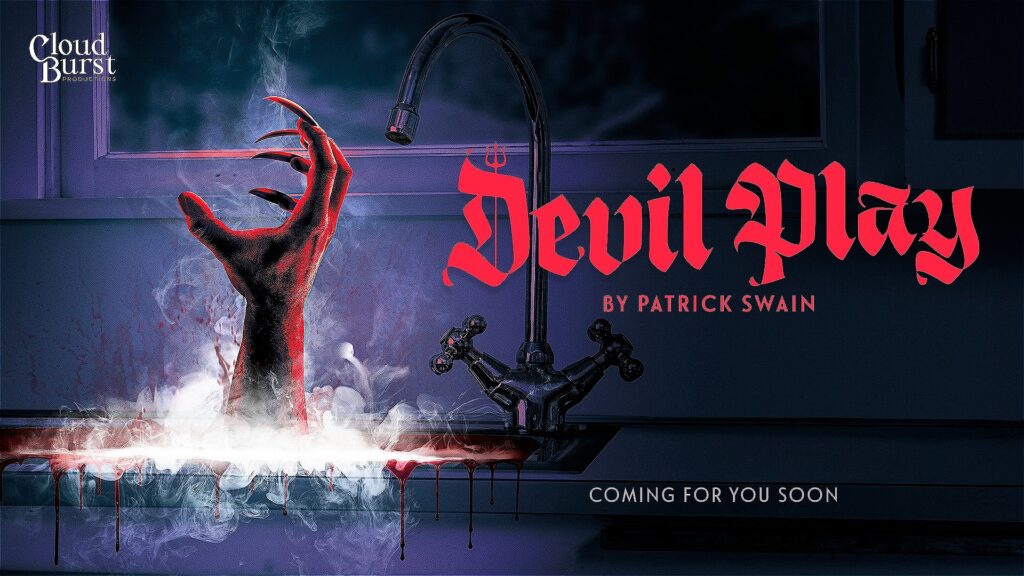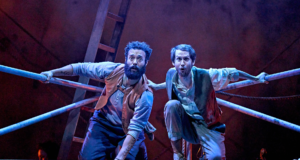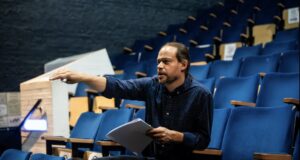Lotty Holder on the challenges in setting up a production company
Cloudburst Productions is the brainchild of Patrick Swain and Lotty Holder. Founding in 2023, they are now making big strides in getting new work to the stage, including being associate producers on Trafulgar Studio’s A Mirror, and their latest show, Devil Play getting a staged reading shortly as part of Pinch Of Vault.
We caught up with Lotty to discuss the challenges faced by any new theatrical company, and hear some words of wisdom for those perhaps thinking of following in their footsteps.
What are the challenges involved in starting a new theatre company today?
That’s a good, massive question to start! It really will depend on what sort of theatre company you want to create, where you are in your career, as well as what work you want to make. But, to speak from our experience, the two main challenges were money and time.
We started Cloudburst in June of 2023, but didn’t announce anything publicly until January this year. That was because at that point, we didn’t have the time or resources to do what we wanted to do, to the level we were aiming at (basically just what would make us proud). We wanted to keep ourselves to ourselves until our ducks were in a row. I was, subsequently, very lucky, and received a Stage One bursary, which allowed me to take time to work on the company. This is honestly the main reason we’ve been able to launch, and now find work to sustain my time. Patrick works part time, again, to support him alongside our work on Cloudburst. This has meant that now we’re able to really give ourselves the best chance at getting something sustainable off the ground, and be fully present for our projects.
How has the cost-of-living crisis impacted raising funds?
How hasn’t it, really.
Firstly, everything has increased in price, lots quite dramatically, making the amount you need to raise far higher than it has ever been. Rightly so, union minimum wages have increased to try to keep up with inflation, but again that means there is more money to raise to ensure you’re giving everyone a fair deal – which is one of the core values we founded the company on.
Secondly, because there are now larger amounts to raise, those who might once have been able to fund their own work or rely on box office returns are being priced out. They’re having to turn to other places like the Arts Council, foundations, private investors, and the public. That’s making these avenues far more competitive, and far harder to secure funds from. The funders pots now don’t stretch as far, as the projects they’re funding are more expensive. It all just compounds.
It’s also meaning that audiences aren’t buying as many tickets. As much as I believe theatre is a necessity, if you’re struggling to buy your weekly groceries, you’re not buying a theatre ticket – let alone to something untested and new. Ironically, it’s also meaning that tickets are more expensive, often not because the producers are planning on making loads of money, which I think is what you see a lot of people accusing them of online, but simply to cover the massively rising costs of putting on work – else they can’t put any on.
In short, it’s made it even harder to put on high-quality work, that pays everyone fairly, brings in diverse audiences and is accessible to those across the socio-economic scale. Even shorter: It’s made an already hard job even harder.
What alternative sources of funding are available now vs the past? Crowd funding, etc?
There are a few ways you can fund your work, but I don’t think there’s been a huge influx of new funding methods coming on the market. I think that the main difference between now and ‘the past’ is that more people are having to turn to multiple funding streams rather than one.
A production that ten years ago may have been run on one arts council bid, will now more than likely need that bid, a decent box office return, some form of donation from company reserves, as well as perhaps some crowdfunding for an R&D.
For companies, especially a new one like ours, this is where the challenge lies. It’s why, as well as raising funds for productions, we also raise funds to keep ourselves running as a company across public donations on Ko-Fi, and services for hire. We offer ACE access and bid writing support, script reading, consultation, general management, and marketing, that anyone can hire. This not only supports the companies who need help in these areas but really does keep us ticking over.
How has new technology changed the process of setting up a theatre company?
The main thing for us has been remote and flexible working. It’s meant that wherever we are, we can get together to work on things, or even make digital work with people across the country, in a way that’s super low cost and frequently more accessible.
It’s also opened up our options for part-time work outside of Cloudburst. It may not be Romantic, but you’ve got to eat, you’ve got to keep your mental health up, and therefore you’ve got to have a non-stressful income stream. We can get producing work for a few days a week entirely remotely, from anywhere in the country. This allows us to generate money to live far more easily. We’re also paying less for petrol and trains, which is nice.
How do you go about attracting attention for your productions when in the early stages of being a new theatre company?
This is something we’re still figuring out, but our strategy is currently two-fold.
First just basic things – artwork, social media presence, networking. We put a good amount of time and effort into the look of the shows, trying to make them eye-catching and memorable. We ask whether people would want a poster of it in their room, and if yes, we’re on the right track. We’ve both worked as social media managers, and know the benefits of a constant presence, which we’re aiming to slowly build. Networking is a bit of a demon word, but it’s really just making friends you trust, and are trusted by in return. It’s how we’ve managed to work on some west-end shows, and in return, hopefully get some interest in our work.
Two, we’re trying to involve audiences in the development of our work as much as possible. Devil Play is a prime example of this. It’s such a small run, at a wonderfully intimate venue, so we’re up close and personal with the audience. We ask for their feedback, so we can build the show into something that they actively want to see. We hope this will reassure them that we really do care about their experience, as well as slowly getting them interested and involved with the work. We’d love for them to follow its journey and support it from start to finish.
How does being a working-class artist affect what you do?
When I first started in the industry it meant I had zero contacts, and I mean zero. It’s why I think I still have a really great relationship with my lecturers back up in York Uni, as they were the first people I met who had any relationship to the professional theatre industry. Secondly, it means we can’t self-fund productions, R&Ds or development periods in the ways other people may be able to. At times we’re able to put a small number of reserves into a project but it’s not a common thing for us – they’re reserves that are built project by project. I like to think that it’s made us far more collaborative, as we rely on others to get our work out there. We have to actively meet new people and forge relationships off our own backs, we have to put ourselves out there and take risks, which in my opinion can only lead to more exciting art. More challenging to get off the ground yes. But more daring too.
How are you doing differently from other theatre companies?
I think we’re unique from other companies for a couple of reasons. One, the scales at which we work. As previously mentioned, we’re very lucky to be working on some incredible West End titles at the moment – namely A Mirror that’s playing at the Trafalgar Theatre and Instructions for a Teenage Armageddon which opens at the Garrick in March. Simultaneously, however, we’re also working on fringe, off West End and small development projects. We aim to bridge the gap that we think can often seem so wide between small scale work and larger tours and runs in cities. So, from your first new-writing session, to the closing night of your (five star, obviously) west-end debut, Cloudburst will be by your side.
Secondly we work across both stage and screen. This allows us to work with talent across the creative sector and hopefully very soon enable us to help train artists and take them with us across mediums. We want to help not only increase collaboration between the theatre and film, but allow artists to broaden their skill sets to have careers in both.

You’re putting on Devil Play as part of Pinch of Vault, is this going to be a good taster of what you have planned for the future?
Yes! We’re super excited about the reading at A Pinch of Vault as it will be the first chance we get to test the bulk of the show in front of an audience and get their feedback. We really want to make work that not only we enjoy, but that gets audiences excited! Hearing their thoughts for us really does impact what the show will turn into. It’s also our first development project of a show from the ground up so it definitely speaks to the work we’ll be continuing to develop going forwards! But to start off, what more could you want than sacrifices to the abyss on a Kitchen Island? A kitchen island that, we hope, if the show gets bigger, might even hold some theatrical tricks up its sleeves (or cupboards). It’s also set in the North. Take from that what you will.
Our thanks to Lotty for giving up her time and offer up some interesting advice. You can find out more about Cloudburst here. You can catch Devil Play on 21 and 22 February as part of Pinch of Vault, further infomation available here.
 Everything Theatre Reviews, interviews and news for theatre lovers, London and beyond
Everything Theatre Reviews, interviews and news for theatre lovers, London and beyond



